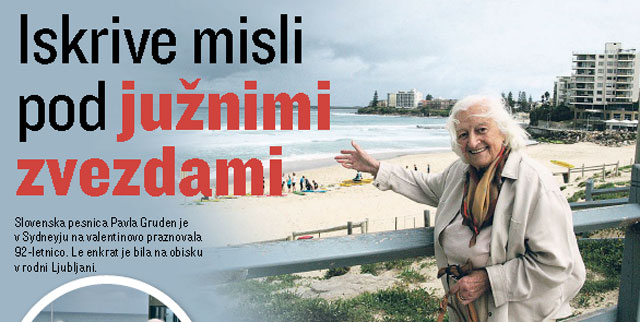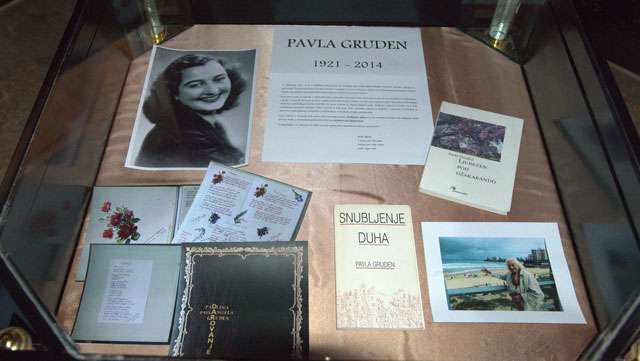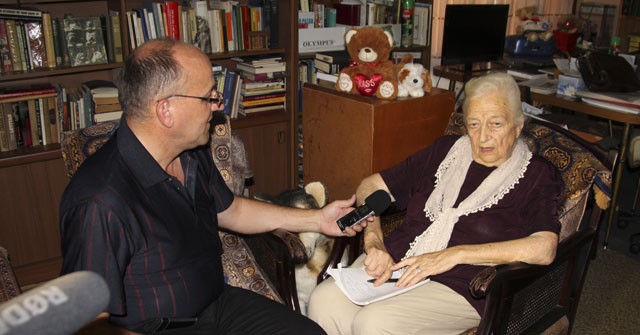Pavla Gruden
se je dokončno poslovila
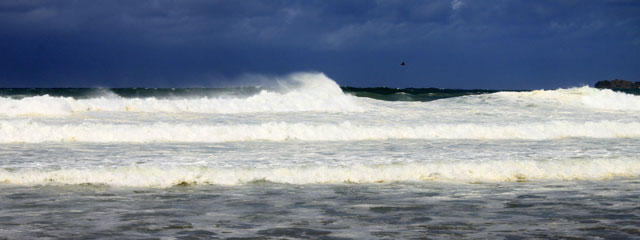
Danes na cvetno nedeljo, 13. aprila 2014, se je Pavla Gruden v krogu svoje družine dokončno poslovila in odplavala v ocean, kar je bila tudi njena poslednja želja.
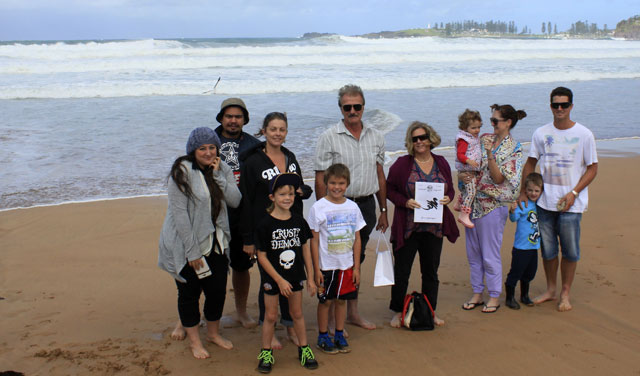
Družina Pavle Gruden
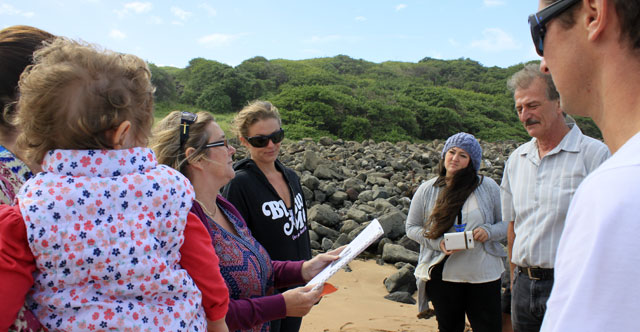
Carol Gruden je prebrala verzi, ki jih je napisala Pavla
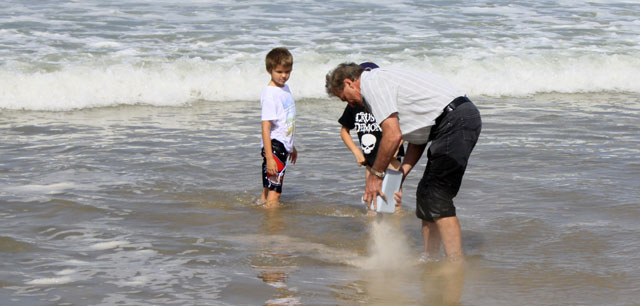
Sin Dušan je izpolnil željo svoje mame Pavle
...
Pogrebna slovesnost Pavle Gruden
5. februarja 2014
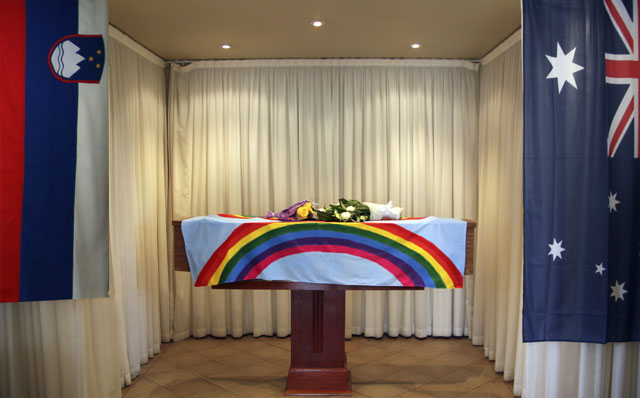
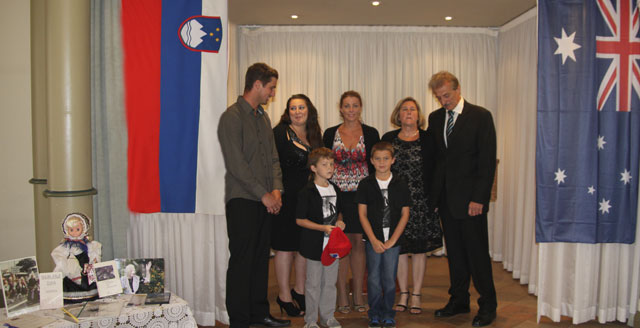
Družina Gruden pred krsto
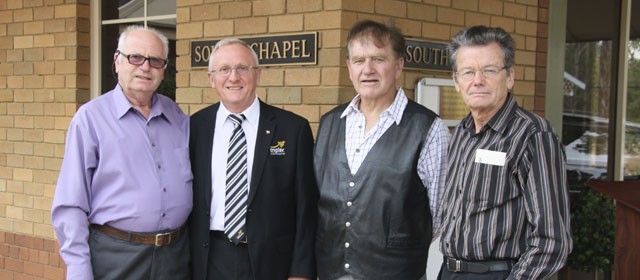
Slovenski predstavniki društev na zaključni slovesnosti, Janez Černe ACT, Peter Krope Triglav Sydney, Franc Čulek ACT in Ivan Rudolf
Wollongong
Eulogy for Paula Gruden,
by Carol Gruden
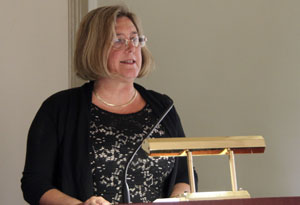
When people talk about the life of Paula Gruden most people use the
word amazing.
When people talk about the characteristics of Paula Gruden people use words like strong, rebellious, spiritual and expressive with her opinions.
Throughout her life she was known as a poet, author, translator, editor and cultural worker as well as being a mother, grandmother and great grandmother.
She believed in life and saw beauty in the simple things. She surrounded herself with good literature, art, flowers, ornamental trees and kindred souls.
They say you should never discuss religion, sex and politics but these were her favourite topics as she believed they were the foundations of life and were an important part of the human existence.
Paula was blessed with a natural gift for languages and a passion for words. She loved the history of words, the sounds they made when spoken and their meanings. She especially loved words that had multiple meanings. Paula would for weeks search for the right word to go in one of her poems. Each word would be deliberately chosen with lots of thought.
Paula was born in Ljubljana, when it was part of the Kingdom of Serbs, Croats and Slovenes. She was happy that she was born on Valentine’s Day, the 14th of February, 1921; a day that love is celebrated.
Her father, Franc Gruden came from Primorska (Prim/ or/ska), the western part of Slovenia. He was a railway man but he knew how to
read and write. Paula like her father had a love of books. Franc died when Paula was 6 and half years old from tuberculosis. Paula always
spoke fondly of her father but her memories mainly consisted of her father in a hospital bed and later visiting her dad’s grave with her mother weekly.
Paula was named after her mother, Paula Zager. Her mother became a young widow during the Great Depression. The mother and child relationship was strained as Paula’s mother became angry and resentful with losing her husband so early. She worked at a variety of jobs but mainly worked in a local restaurant.
Paula told me she was an outspoken child at school who struggled with the concept of being seen but not heard. There were moments when she disagreed with the teacher or professor, said so, and either left school or was asked to leave for a while.
While growing up like most little girls she dreamed of being a ballerina, actress or singer but there was no money for lessons. Paula always had a thirst for knowledge and the truth and wanted to further her studies by going to university. Instead her mother sent her to a trade school to learn secretary skills. She later went to a conservatorium which is like a college but war broke out.
With Paula’s special talents and drive it would have been interesting to
see what she would have achieved if not for the war.
In April 1941 Slovenia was trisected with the country being adsorbed and annexed into neighbouring Nazi Germany, Fascist Italy and Hungry. Paula as a young adult was now living in the province of Ljubljana where the Italian violence against the Slovene civilians easily matched
that of the Germans.
Executions, reprisals and internment became part of everyday life. This
province alone saw the deportation of 25,000 Slavonic people to concentration camps.
I remember Paula telling me “You did what you had to do to survive”.
Like 46,000 other Slovenians Paula was sent to Germany and imprisoned. It is here that her strong will streak shines. While being interrogated by the Gestapo Paula was being uncooperative. They wanted her to work as an interpreter for Nazi Germany. She refused. The officer threatened to shoot her. She shouted “So shoot me”. Paula tempted fate. The officer in frustration slapped her violently across the face and shouted “you are the most obstinate and stubborn woman I have ever met!” Paula was then transported to a forced labour camp. Paula eventually escaped and while travelling across the Balkan Mountains lived off chocolate bars found in the pockets of dead soldiers. It was here that Paula met her future husband. John Miladinovic was a lieutenant colonel in the Yugoslav Royal Army and later a guerrilla fighter with the resistance. Being handsome and a fighter for democracy was a combination Paula could not resist. John was helping Paula leave Germany as the war came to an end in 1945.
John and Paula became what was known as displaced people and in turn experienced the fate of refugees. It was around this time that they married. They were both placed into the Lamie Camp in Yugoslavia. People in the camp were required to wear the initials DP for displaced person on the clothing. Paula fought against this humiliating practice and won.
It was here where Paula’s gift for languages and secretary skills became
invaluable for thesurvival of many displaced people. Paula was soon employed as a secretary and translator for the Allied military
administration in the Free Territory of Trieste. (Tree/est). Paula assistedthousands of people, with the necessary paperwork and interviews needed, to seek refugee status and eventually immigration to a another country such as Argentina, Canada, Australia and America,
On the 27th of May, 1948 John and Paula arrived in Australia. Paula elected Australia as her new country as it was a safe distance from Europe and its threats of war. As a child she had read and dreamed about Australia. It was totally different to Europe and that was what she wanted.
Like many refugees the reality of life in a new country can be more difficult than expected. As an intelligent woman she felt like a second class person working on the Snowy Mountain scheme doing jobs such as cleaning and cooking. In her spare time she continued to assist others by acting as a social worker and interpreter. Eventually John and Paula were able to make a life of their own. They established a home in Marrickville, Sydney and it was here that Paula’s only child, a baby boy, was born at Crown Street Women’s Hospital in
1952.
Danny unfortunately had severe asthma and on the advice of doctors the family moved to the rural, farm area of Ingleburn. It was here that John and Paula continued to struggle to make ends meet. Working on the farm without experience was difficult and both parents had to find second jobs elsewhere to supplement their income. For many years Paula worked as a nursing assistant at the Frank Whiddon Masonic
Homes to help make ends meet. When Paula was 53 and Danny 19, John passed away. Unable to
continue with the farm, the land was sold and subdivided for housing. It was at this point that Paula’s life became easier and she was able to devote her time and energy to her love of writing.
Paula was a prolific writer with a love for all poetic forms. She wrote in both English and Slovene. In 1982 Paula founded the literary magazine Free Conversations and served as its editor.
In 1995 she won international recognition for being the first writer to successfully write haiku poetic form in a foreign language. She has published two books entitled Wooing of the Spirit and Love under the Jacaranda.
Her work has been included in several anthologies such as: The Anthology of Slovene Woman Poets
Anthology of Australian Slovenes, Album of Slovene Literature, and Australian Made: A Multicultural Reader Paula loved Australia and became a citizen in 1959. She commented
that the freedom of Australia allowed her to heal her heart of pain after the war.
Her writings, with Australian back drops and themes, were widely published in Slovenia making her an unofficial ambassador for this
country and region. In 1980 she was selected to meet Queen Elizabeth during her Royal
visit in recognition of her literacy achievements and promotion of Slavonic culture in Australia. From 1981 to 1982 Paula was on the judging panel for the NSW Premier’s Literary Awards. Paula was also honoured when she was selected to be interviewed by a Slovenian television crew who flew to Australia. A documentary entitled: Paula Gruden My Life My Love was produced and went to air.
Although Paula was once described as a Slavonic living legend she was shy about her work and did not seek fame.
Despite this, with her passing on Australia’s Day, her homeland Slovenia has honoured her with a special exhibition in the National Library in Ljubljana.
Writing was the champagne in Paula’s life. Her son Danny, her grandchildren Troy, Belynda and Elizabeth and myself, her daughter in law and friend, are all very proud of her achievements.
Today we hope to honour her, not only as a writer, but as a mother, grandmother, great grandmother and friend.
Personally, it has been a pleasure to have known and loved such a unique talented lady and I know that her cosmic energy will be with us
forever.
IN MEMORIAM:
PAVLA GRUDEN
V miru Božjem naj se spočije Pavlica – tako sem jo smel imenovati že nekaj let, ko sva se kar po nekajkrat na mesec slišala po telefonu. Ko sva pogovor končala in je telefon zopet takoj zazvonil, sem že vedel, da želi Pavlica še nekaj povedati. Klicala je ob različnih urah dneva, enkrat celo ob 3.20 zjutraj: Veš, ne morem spati. Jaz tako rada v tem miru pišem, je povedala v opravičilo. Najini pogovori so se nanašali na poezijo, na iskanje prave besede, na pomen in razčlembo besede, na vero in Cerkev, na slovenske duhovnike v Avstraliji. To so morali biti iskrivi pogovori med njo in patrom Bernardom Ambrožičem! Veliko sta sodelovala v 50-tih letih 20. stoletja, ko je bil pater Bernard urednik Misli. Veliko njenih člankov in pesmi je v tistih, sedaj porumenilih straneh Misli, pa še kako dragocenih.
Živo in navdušujoče je spremljala sedaj papeža Frančiška. Tekom let mi je podarila kar nekaj zanimivih knjig in seveda svoje poezije. Moral sem prebrati tudi kaj takega, kar mi ni bilo ravno v veselje, saj je Pavlico zanimalo toliko stvari in Božja kozmična ustvarjalna sila je tako neznanska!
Ko ni več imela svoje zbirke Ljubezen pod džakarando, o kateri piše Tone Gorjup, me je prosila, če bi ji naredil kopije. Poslal sem ji svojo (njeno) knjigo, ona pa meni pred nekaj tedni kopije. Njena zadnja prošnja je bila, če bi ji z Marijo Anžič natipkala njeno zadnjo pesniško zbirko, ki jo še vedno dela. Seveda, Pavlica, z veseljem bova to naredila... Pa sedaj že vem, da ne bo nič iz tega...
Roka Pavlice je omahnila, pepel bo potrošen v ocean, srce, ki je otrpnilo za ta svet, pa bo objelo Jezusa: Veš, tako imam rada Jezusa, in on mi vedno pomaga, so bile še njene besede nekaj dni pred smrtjo.
Hvala Bogu, Pavlica, sem dejal, za Tvoje tako veliko srce!
V bližnji priložnosti se bomo tu v Avstraliji kot Slovenci in kristjani hvaležno spomnili umetnice Pavle Gruden. Za to številko Misli sem ob misli na slovenski kulturni praznik že dva tedna pred smrtjo Pavlice, izbral njeno pesem. Sem si mislil, z njeno pesmijo bomo počastili Prešerna, naš rod in rojstni dan Pavle Gruden! Z isto mislijo jo sedaj spodaj ponatiskujem, le da zdaj že vemo za Pavlin nebeški rojstni dan!
Draga Pavlica, veselo plavaj v neizmernem Božjem oceanu!
pater Ciril A. Božič OFM OAM
NAŠA BESEDA
Zvok božanskega izvora,
dvorezen meč pravičnosti,
človeškega srca zrcalo,
ljubezni strelica,
pečat na laži
in kažipot človeku
je beseda, najbolj mila –
rodna.
Slovenske duše iskra
beseda naša, plodna,
podžigala je puntarjem
pod noč kresove.
Bila je tudi iverje,
ko nam zadala je grobove
in sramotna dela
na tujčevo povelje.
Vendar lepota njene žalosti
nikogar ne zatira;
mati naše zgodovine je
in plod ljubezni, ki
k prerojenju kliče
ter prostor srečnih išče:
cvet iz svetega grobišča
slovenskih velikanov.
Pavla Gruden
Odšla je Pavla Gruden
Piše: Tone Gorjup |
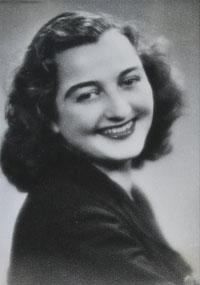 V Sydneyu je 26. januarja 2014 umrla slovenska pesnica in kulturna delavka Pavla Gruden. V Ljubljani rojena umetnica, ki je dobrih 65 let živela v Avstraliji, je minulo poletje o svojem življenju in ustvarjanju spregovorila za oddajo Naš gost. Kljub visoki starosti je bila njena govorica živahna, slikovita in polna energije. Iz nje so vreli verzi. V Sydneyu je 26. januarja 2014 umrla slovenska pesnica in kulturna delavka Pavla Gruden. V Ljubljani rojena umetnica, ki je dobrih 65 let živela v Avstraliji, je minulo poletje o svojem življenju in ustvarjanju spregovorila za oddajo Naš gost. Kljub visoki starosti je bila njena govorica živahna, slikovita in polna energije. Iz nje so vreli verzi.
Pavla Gruden se je rodila na sv. Valentina dan leta 1921 na Gornjem trgu 9 v Ljubljani. Oče, doma s Primorske, je bil železničar. Mama, vrsto let pomočnica v bližnji gostilni, pripravna za vsako delo. Pavla se rada spominja brezskrbnih otroških dni. „S praga domače hiše sta se videli osnovna in meščanska šola, tramvajska linija ... To je bil najožji del ulice Gornji trg. Ni bilo videti zidov, ampak živžav na ulici. Vsi sloji ljudi so bili tam: zbiralci cunj in steklenic, brusači, čevljar, Kajfeževa gostilna, kjer so reveži jedli zastonj, pa pek Žužek ... „ Oče jo je naučil brati in pisati; ljubezen do knjig je dobila po njem. Žal je umrl, ko je imela šest let in pol. Kot deklica je sanjala o baletu, a denarja ni bilo. Obiskovala je trgovsko šolo, se vpisala na konservatorij, a so se ji teoretični predmeti upirali. Prišla je vojna. Zapor. Prisilno delo v nemški tovarni avtomobilov. Ko je pripovedovala o vojni in dogodkih po njej, se je večkrat razvnela. Še to in ono bi rada povedala. Ker je bila nadarjena za jezike in je rada govorila, so jo kmalu opazili in jo uporabili za prevajalko. Zaradi upornega duha in jasnega izražanja svojega mnenja, se ji tudi po vojni ni godilo najbolje. Zato se je odločila za pot na tuje.
Čeprav je po „odhodu“ iz Ljubljane doživljala usodo begunke, so jo kmalu zaposlili kot prevajalko. Leta 1948 se ji je odprla pot v Avstralijo, o kateri je sanjala v šolskih letih. Tudi tam je izkusila življenje v zbirnem taborišču. S prvo službo se je znebila oznake DP in zadihala svobodno. Zamenjala je vrsto poklicev: od čistilke in kuharice, do socialne delavke in sodne prevajalke. Preizkusila se je celo v pridobivanju evkaliptusovega olja. Poročila se je, si ustvarila družino, za nekaj časa sprejela priimek Miladinovič in se ustalila v Sydneyu. Po zgodnji moževi smrti ji je ostal sin Dušan, danes pa ima vnuke in pravnuke. Njena hiša stoji na obrobju mesta. Zunaj je obdana s cvetjem in okrasnim drevjem, znotraj pa obložena s knjigami. Kot je pripovedovala je spala le dve ali tri ure na dan. Pogosto v naslonjaču, s knjigo v roki, skodelico čaja pred sabo in cigareto v pepelniku. Tako je zaspala tudi 26. januarja 2014, ko je sklenila zemeljsko pot in se pridružila očetu, katerega bližino je pogosto čutila ob sebi. Kot si je vedno želela, je potrdila njena prijateljica.
V Avstraliji je bilo na prvem mestu preživetje. Ko skrb za vsakdanji kruh ni bila več glavna, se je oglasilo domotožje. Ne toliko hribi in planine, slovenska pesem, bolj jo je prevevala želja po bližini z domačimi. Hrepenela je po tem, da bi bila golobica, ki prenaša pošto od ene do druge obale … z željo, da bi se ljudje imeli radi med seboj ... Pesmi so se rojevale in prihajale na plan. Pisala je, ker je tako čutila. Razočarana je bila nad literarnimi teoretiki in kritiki, četudi so njeno haiku poezijo dobro ocenili. „Nikogar ni, ki bi potipal mojo dušo. Jaz vem, kaj se v moji duši dogaja ... „
Pred najinim srečanjem je iskala svojo zadnjo zbirko „Ljubezen pod džakarando“. Ni je bilo. Zadnjo je podarila in sama ostala brez nje. Našla pa je star družinski album. In rodil se je haiku:
Družinski album
oguljen od časa slik
v pozabi starke.
Po njenih besedah je poezija poštena samo, če se sama oglasi ... ti pove resnico. Ne velja, da se usedeš in začneš „štancati“, kakor so rekli včasih. Spoštljiva je do besede, do slovenskega jezika, čeprav ji tudi angleščina ni tuja. Kot pesnica je plaha.
Pesem, tvoj pes sem, ta sveti lajež je tvoj.
Tudi o prozi je razmišljala. V sebi nosi roman. Vrnila bi se v medvojni in povojni čas, k svoji boječi in sramežljivi prijateljici, ki se je kljub temu nosila kot visokorodna gospa ...
In za konec še nekaj misli:
Slovenec je pozabil od kje je doma.
Moja mama je znala denar obrnit in nikoli ni vrgla ničesar stran.
Ne bodi domišljav, ne misli da si ne vem kaj!
Nisem imela nobenih kvalifikacij, pa sem prišla dobro skozi.
Radio Ognjišče, celoten članek>>>
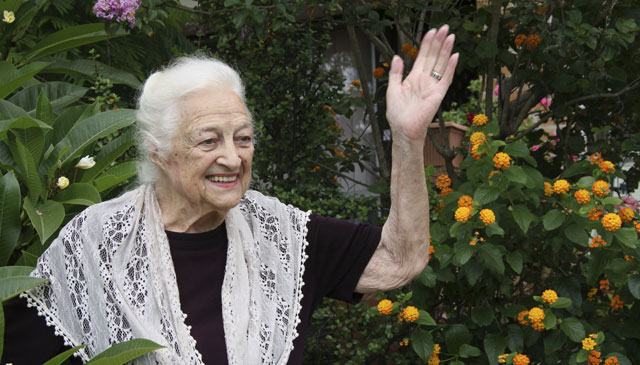
|


